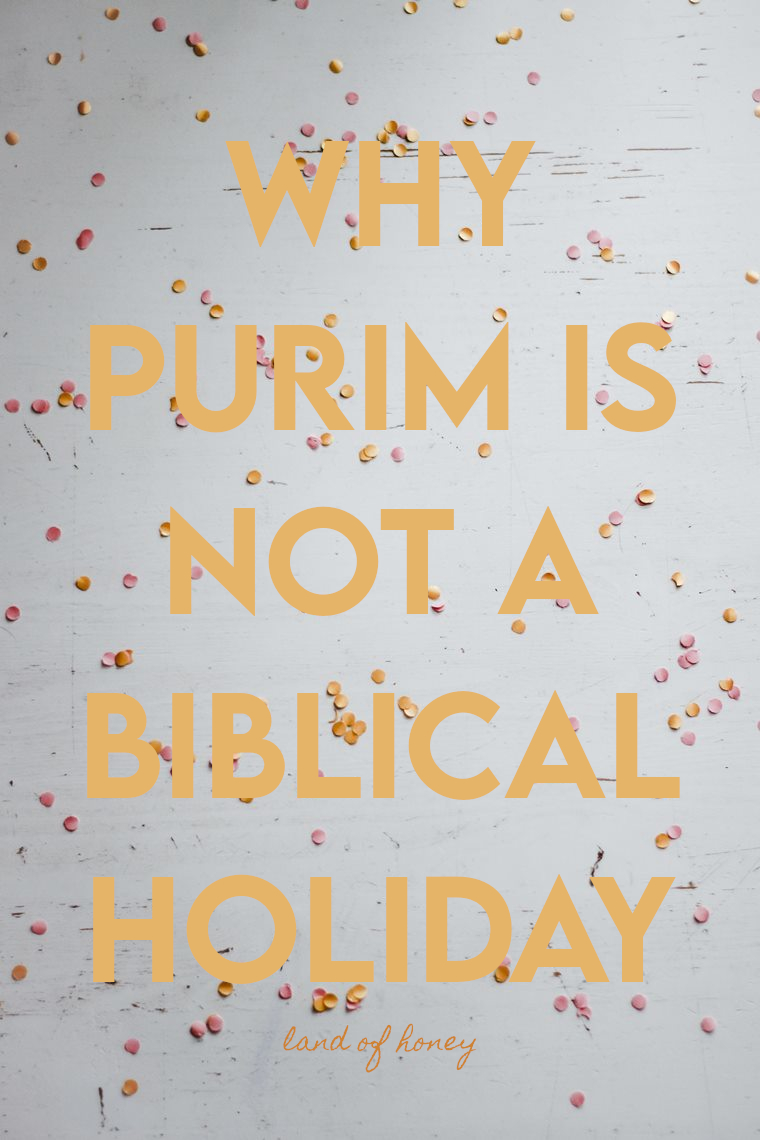Is Purim a Biblical holiday?
While many people intend to celebrate the events of YHWH preserving the Jewish people through the actions of Queen Esther when they celebrate Purim, that does not make this cultural holiday Biblical.
Why isn't Purim considered a Biblical holiday?
Biblical holidays are defined as holidays that YHWH directs believers to keep or observe. These are the set apart times of Passover, Unleavened Bread, First Fruits, Shavuot, Trumpets, Yom Kippur, and the Feast of Tabernacles. The Living God himself directed believers to celebrate these and gave us information on when they happen and any special instructions for the festivities. You can read about these in Leviticus 23.
These are the only Biblical holidays, because they are the only holidays that the Creator tells us to celebrate.
Are Purim and Passover the same?
No, these are two completely separate holidays! Again, while keeping Passover is something YHWH directs believers to do in Exodus 12, Leviticus 23, and Numbers 9, among other places, we are given no mandate from YHWH to participate in a holiday called Purim. At Passover we remember and honor the death of the Messiah, as well as the Living God bringing freedom to his people from slavery in the Exodus story. The historical aspect of Purim is to celebrate events in the book of Esther. Passover happens about a month after Purim.
Is Purim in the Bible?
But isn't Purim in the book of Esther? Yes, the book of Esther does tell us about a manmade holiday known as Purim. But even if you believe the book of Esther is rightly canonized as part of Scripture (which many scholars don't - Esther is not referenced in any other book of the Bible and is the only book of Scripture not found among the Dead Sea Scrolls), there is no directive from YHWH to celebrate this day - in fact, there are no words at all from the Living God and no mention of his name in this book. It's important to see that even if Purim is mentioned in Scripture, that's not the same as it being ordained by YHWH, let alone a command.
What is the feast of Purim?
The feast of Purim commemorates the events from Esther 2-9. The evil Haman, advisor to King Ahasuerus, plotted to destroy all the Jews in the king's provinces. Queen Esther risked her life to go to the king without being called for, invited him to dinner, and eventually exposed Haman's plot to the king. The king then authorized Esther's cousin Mordechai to write a decree stating that the Jews could defend themselves from attackers on the appointed day. The Jews were able to overpower those who hated them and wound up killing more than 75,000 people.
Ostensibly, Purim is a celebration of the preservation of the Jewish people. Note that the Jewish people refers to members of the Southern House of Judah, and not the Northern House of Israel at this point in history.
How is Purim celebrated?
Traditionally in Judaism, Purim is celebrated by public reading of the scroll of Esther. Gifts or financial support are sent to the poor. Many wear costumes, often in a 'carnival' atmosphere. A triangle-shaped cookie known as hamantaschen - to symbolize the ears of Haman is consumed, along with large amounts of alcohol - in fact, the Talmud says that its the duty of celebrants to drink until they cannot recognize the difference between Haman and Mordechai.
Should Christians celebrate Purim?
I firmly believe that all Bible believers should celebrate the Biblical holidays, but we have established that Purim is not one of those. Coupled with typical celebrations often including things Scripture says not to do, like crossdressing, and getting drunk, I have pause about taking part in this. Should we be grateful for the miracles of this story? Of course, but by not adding this manmade holiday to YHWH's Biblical holidays, we make celebrating the Biblical holidays more approachable, by showing that it's okay to stick with Biblical commandments without adding manmade traditions to the mix of our faith.
Please note that this post is to clarify why Purim is not included as one of the seven Biblical holidays. I realize it is a significant holiday in Judaism, with historic and spiritual meaning. I mean no disrespect to that. My goal is to teach the distinction between what Scripture says and Jewish customs. Many Jews have told me they don't want to see the Messianic movement appropriating their culture, which is why I want believers in Messiah to know the difference between Jewish culture and Biblical commandments. Blessings to all!
Related posts:
The Two Houses: Israel and Judah in Scripture
Why Hanukkah is Not a Biblical Holiday
The Beginner's Guide to the Biblical Holidays











